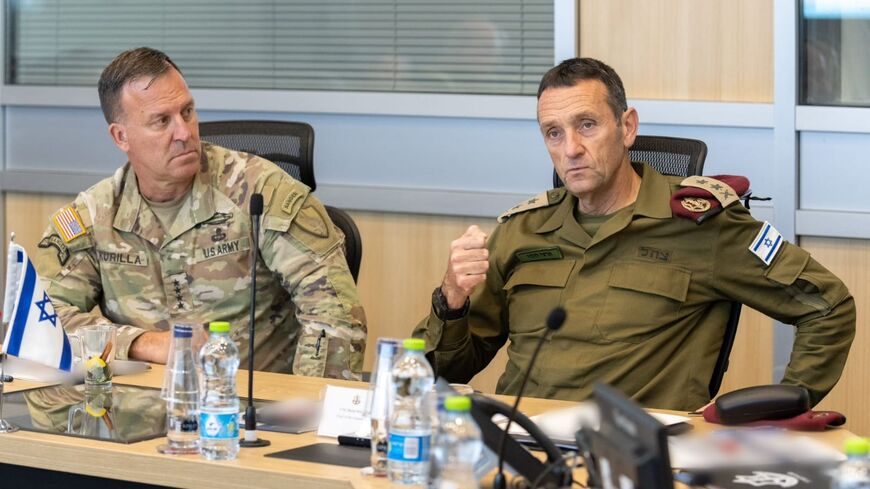The head of all US forces in the Middle East, Gen. Michael Erik Kurilla, arrived in Israel on Tuesday for a three-day visit as part of a wider tour of the region amid lingering tensions with Iran.
Kurilla arrived just a day after the Israel Defense Forces (IDF) kicked off two weeks of war games to simulate a multi-front conflict.
The CENTCOM chief was set to observe the exercise, dubbed Firm Hand, and was photographed alongside IDF chief of staff Lt. Gen. Herzi Halevi on Tuesday. The current Israeli exercises do not include US forces, one official told Al-Monitor.
In a statement, the IDF said Kurilla’s visit began with a stop at one of Israel’s more secretive intelligence outfits, Unit 504, which runs the army's human intelligence. The US commander was briefed on the unit’s recent operations and future direction and planned capabilities, the statement added.
Later, Halevi hosted an operational panel discussion in which Israeli army commanders discussed with Kurilla and his staff cooperation with the US military and deepening combined operational capabilities.
Kurilla also participated in a situation assessment meeting as part of exercise Firm Hand at the IDF’s underground operational headquarters in Tel Aviv.
The exercise is designed to test the IDF’s readiness for combat in multiple arenas simultaneously, as Israel witnessed this year. The two generals also discussed “innovative combat methods and adapted military capabilities,” according to the IDF statement.
The exercise takes place less than a month after Israel's strikes on Gaza, which killed senior leaders of the Islamic Jihad militant group and over 20 Palestinian civilians. The escalation followed rocket barrages from the Gaza Strip following the death of a Palestinian hunger striker in Israeli prison.
In early April, some three dozen rockets were launched from southern Lebanon into northern Israel. The IDF said most of the projectiles were intercepted and suggested Hamas was behind the barrages, though no group claimed credit. It marked the most significant flare-up on the Lebanon border since the 2006 war.
In Syria, to Israel’s northeast, militias backed by Iran's Islamic Revolutionary Guard Corps have been subjected to regular Israeli air strikes targeting guided weapons systems.
Tens of thousands of Israeli soldiers, both regular and reserve, are expected to participate in the exercise, which combines forces in the land, sea, air and cyber domains, the IDF said.
Among other events, the exercise will simulate a series of rapidly escalating incidents and terror attacks from the West Bank and Gaza and in Jerusalem, culminating with simulations of fighting in the south of Lebanon. The soldiers will be faced with simulations of rockets fired simultaneously from different directions along with cyberattacks on Israel’s communication, internet and radio infrastructures, the IDF said.
Interviewed on the 103FM radio station, Brig. Gen. (res) Amir Avivi explained on Tuesday that "for the first time, after many years, the IDF is dealing with a multi-arena situation in the entire Middle East that extends to Iran." He added that the situation presents "huge challenges for the Home Front Command in terms of destruction, and also a much more complex naval arena."
Kurilla’s visit came as Israeli officials have been hinting that they suspect Iran has made progress toward potentially weaponizing enriched uranium. US intelligence officials have said Iran’s leaders have not yet decided to construct a nuclear bomb despite enriching uranium to levels up to 60% — well beyond limits permitted by the 2015 nuclear accord.
The Biden administration has openly signaled its support for Israel’s leaders should they take the country’s security against Iran into their own hands.
Yet officials in Washington have long worried that a unilateral Israeli strike on Iran’s nuclear sites could trigger a wider conflict that could destabilize the Middle East.
In January, CENTCOM and the IDF practiced long-range strategic airstrikes launched from a US carrier in the Mediterranean for the first time.









